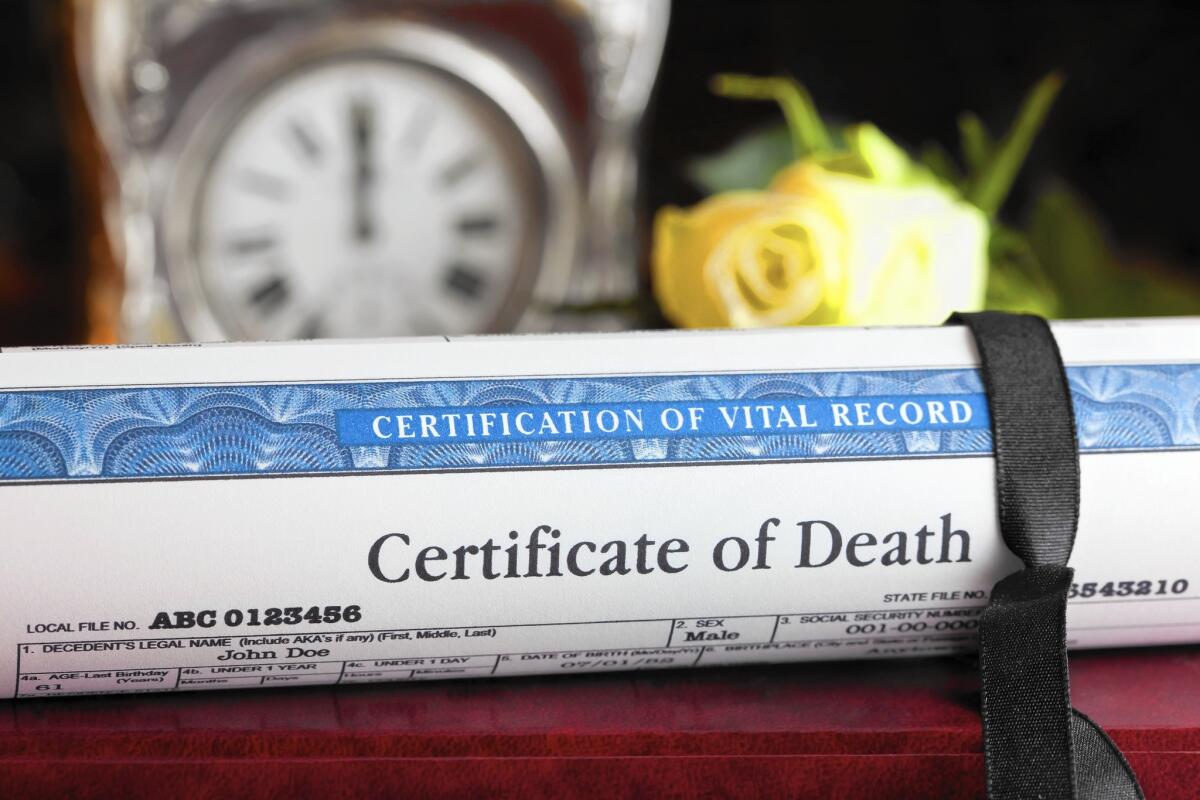Personal Finance Q&A: Don’t ignore a deceased spouse’s credit report

Credit bureaus should be notified of a death because even dead people can be victims of ID fraud.
- Share via
Dear Liz: How does one get credit reports for someone who is dead? My deceased husband is still on my mortgage and I’d like to review his report to make sure it is correct. The estate went through probate, so I have court documents showing I am the executor. I looked at credit bureau websites and attempted to contact them by phone but have not been able to determine what information they need or where it should be sent.
Answer: The only thing that needs to be correct about your husband’s credit reports is the fact that he’s dead. Any other mistakes are irrelevant at this point, but his identity can still be stolen if the bureaus don’t know he’s deceased.
This is no small issue. About 2 million dead people have their identities stolen every year, either because they’ve been deliberately targeted or because criminals filling out credit applications used made-up Social Security numbers that happen to match those of people who have died, according to a 2012 study by research firm ID Analytics.
Eventually, the credit bureaus should get word of a death. Bureaus periodically check the Social Security death master file, which is a database of all the deaths reported to the agency. Lenders also notify the bureaus when they receive information that someone has died.
Just to make sure, though, you should notify the bureaus directly. Ask that a “deceased alert” be added to his files. Send death certificates — the real thing, not photocopies — by certified mail, return receipt requested. The addresses to use include:
TransUnion LLC, P.O. Box 2000, Chester, PA 19022
Experian, P.O. Box 2002, Allen, TX 75013
Equifax, P.O. Box 740260, Atlanta, GA 30374
Public pensions can reduce Social Security benefits
Dear Liz: I am one of the thousands of adjunct faculty who teach in our nation’s colleges. We are paid on an hourly or per-class basis. We therefore earn a fraction of what tenured faculty earn. I am covered by a state teachers pension, but my anticipated benefit, even after 30 years of teaching, will not exceed $1,500 per month. I have qualified for a modest Social Security benefit of perhaps $1,000, accrued through years of part-time work as a student and graduate student. I have been told that my Social Security will be reduced because of my teacher’s pension.
Surely this cannot be correct. I understand that if I were collecting a generous state or military pension, I would not need Social Security. However, without my Social Security, my teacher’s pension will not even lift me above the poverty level. Isn’t there some sort of “means testing” before they slash your Social Security benefit?
Answer: You were informed correctly. When you receive a pension from a job that didn’t pay into Social Security, any Social Security benefit you did earn may be reduced (but not eliminated). Before the creation of the Windfall Elimination Provision, people who received pensions based on earnings not covered by Social Security often got a proportionately larger benefit than those who paid into the system their entire working lives.
The Social Security site has a chart and a calculator to help you understand how your benefit might be affected. The chart shows that if you reached age 62 this year and you had fewer than 20 years of so-called “substantial earnings” covered by Social Security, your monthly benefit could be reduced by up to $413 or half of your teacher’s pension, whichever is less. Limiting the offset to half protects people who get small pensions from having too much of their Social Security benefit wiped out. Substantial earnings are wages equal to or above a certain amount each year ($22,050 for 2015) from jobs that paid into Social Security.
Based on the information you provided, your pension and Social Security income would total just over $2,000 a month. That’s not a lot, but the average Social Security check in 2015 was about $1,300. The poverty threshold in 2015, meanwhile, was $980 per month for a one-person household and $1,327.50 for a two-person household.
Questions may be sent to Liz Weston, 3940 Laurel Canyon, No. 238, Studio City, CA 91604, or by using the “Contact” form at asklizweston.com. Distributed by No More Red Inc.
More to Read
Inside the business of entertainment
The Wide Shot brings you news, analysis and insights on everything from streaming wars to production — and what it all means for the future.
You may occasionally receive promotional content from the Los Angeles Times.








